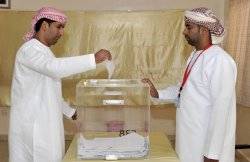Omanis have voted to choose representatives in the 84-member consultative Shura Council, an election overshadowed by discontent over unemployment and alleged government corruption.
The official Oman News Agency said more than 1,300 candidates were seeking seats on the Shura Council, a decade-old body that has no direct authority but advises the ruling sultan.
Many women turned out to cast ballots in the 105 polling stations across the Arabian peninsula country on Saturday, raising the prospect that women would win parliamentary seats they failed to capture four years ago.
The usually tranquil Gulf sultanate was hit by protests in February, part of the Arab Spring of uprisings that toppled the rulers of Egypt and Tunisia.
Omanis focused their demands on higher wages, more jobs and an end to graft rather than a change of government. Many also called for more powers for the council.
Sultan Qaboos bin Said, who has ruled Oman since 1970, promised to give the Shura Council some legislative powers, and, trying to head off further protests, announced programmes to create jobs and fight corruption.
Public campaigns
About 520,000 people registered to vote for the Shura Council, compared with 388,000 in the last election in 2007. Districts with a population of 30,000 elect two members, smaller districts choose one. The first elections were held in 1991.
The voters this time will make up nearly 33 per cent of Oman's local population of 1.6 million people.
About 40 per cent of the people in the sultanate are under the voting age of 21, according to official figures.
Some 1,300 candidates are competing in the election, of whom 77 are women, up from 700 candidates who ran in the previous election in 2007, when 21 women ran for seats.
"The sultan has promised the new Shura members would be able to legislate but it is not clear yet in what capacity," Abdulla Al-Harthy, a former protest organizer, told Reuters.
"What is clear, is that the decision is aimed to please his people to make sure there will be no more protests."
Deena al Balushi, a candidate for Seeb town in the capital Muscat, said that public campaigning, which the government has allowed for the first time, made a big difference in the higher number of women standing for election.
"Women candidates, who campaigned quietly in 2007, this time used newspaper advertisements, street posters, public speaking and the electronics media to publicize their candidacy," Balushi, a legal corporate counsellor, told Reuters.
PHOTO CAPTION
A man casts his vote at a polling station during the Shura Council elections in Buraimi October 15 2011
Al Jazeera


 Home
Home Discover Islam
Discover Islam Quran Recitations
Quran Recitations Lectures
Lectures
 Fatwa
Fatwa Articles
Articles Fiqh
Fiqh E-Books
E-Books Boys & Girls
Boys & Girls  Articles
Articles










